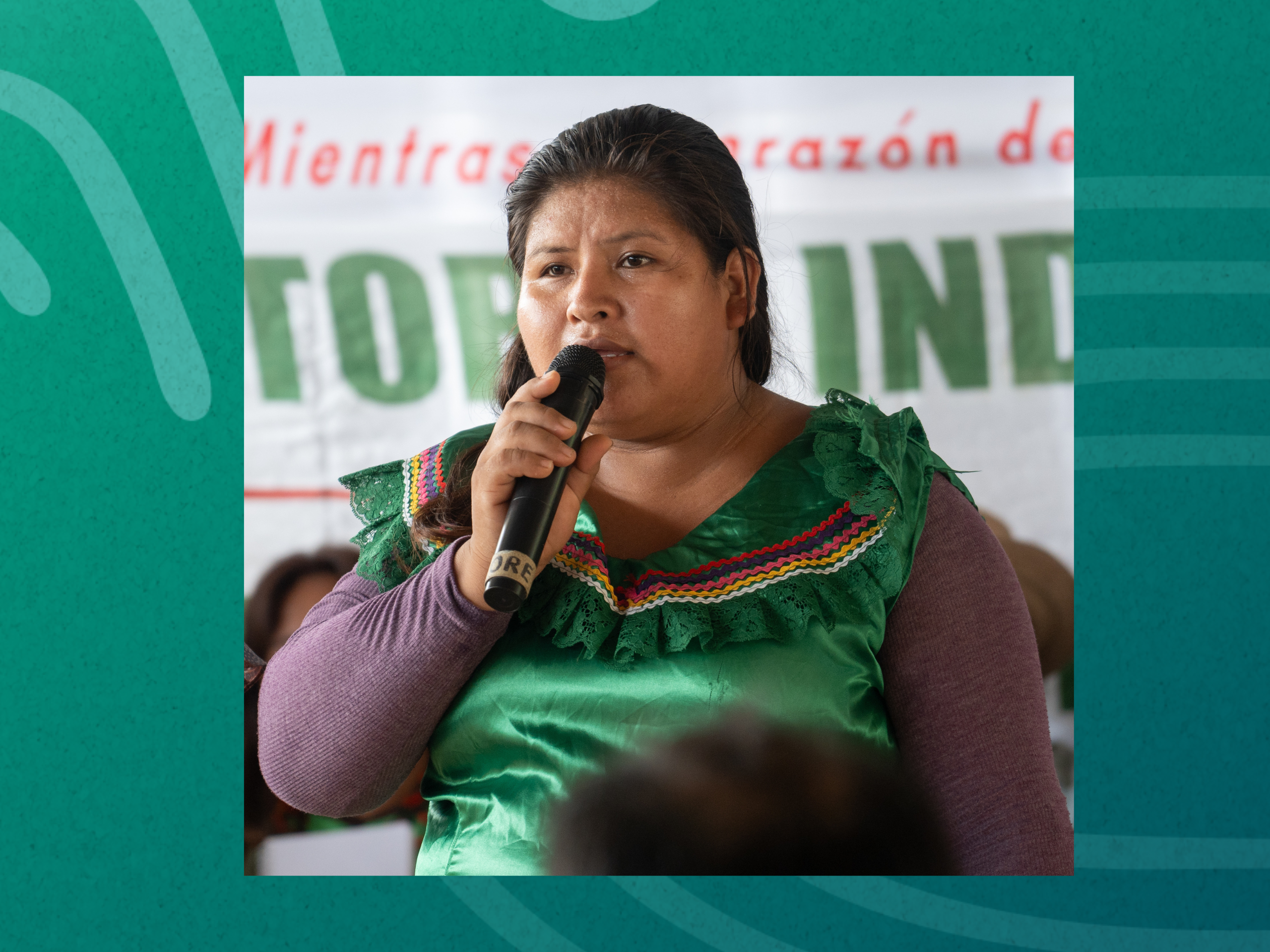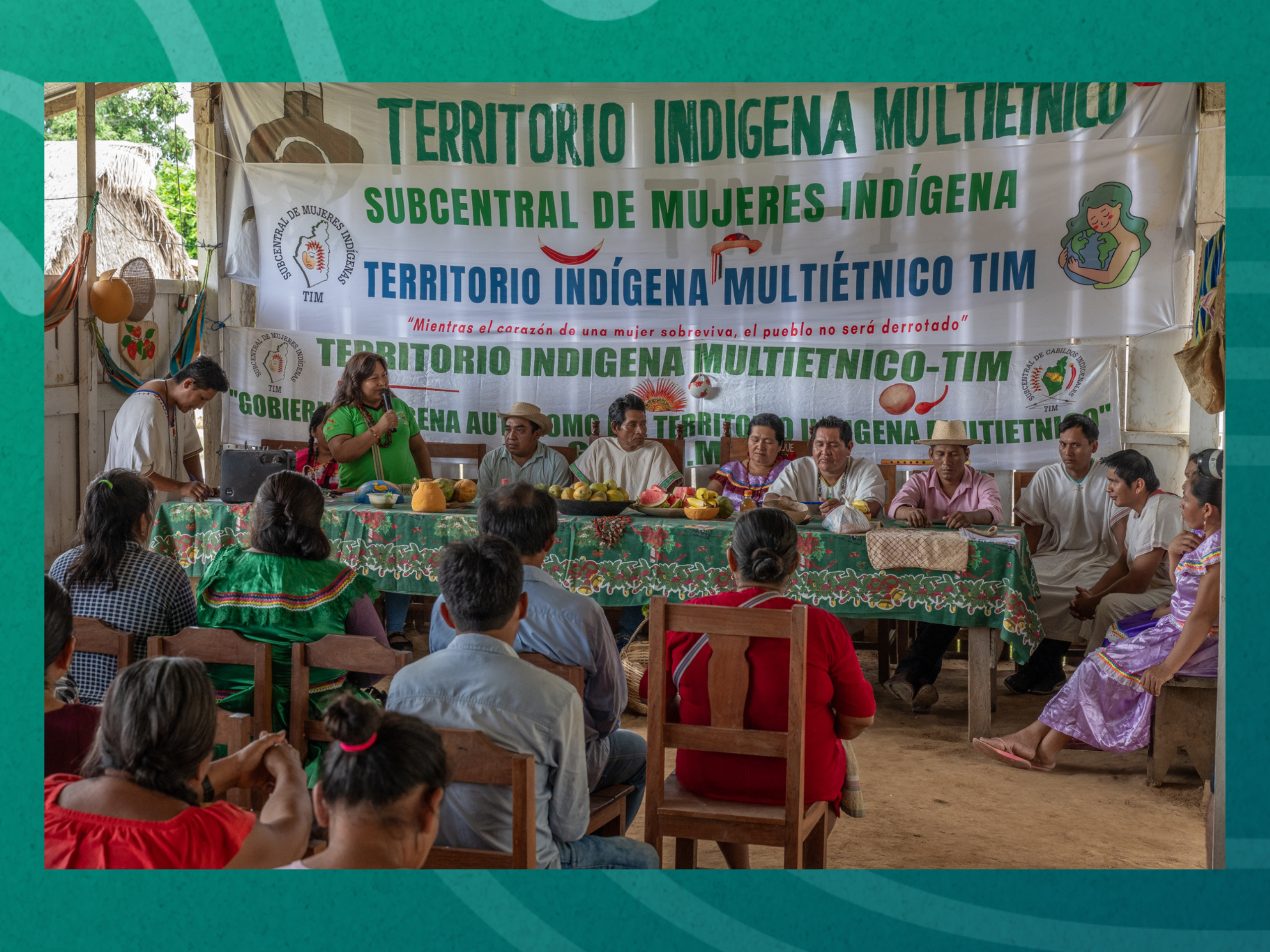2025-03-31
In the lowlands of Bolivia, women are challenging gender stereotypes by assuming leadership positions in their communities. Many of these women have been encouraged to assume these posts in large part thanks to the tools they have received in trainings developed by the National Confederation of Indigenous Women of Bolivia (CNAMIB).
We are making our way through a dirt road; the car windows are rolled down and we breath the warm air of the jungle. Jungle. That is all we see. Towering green trees, tojos nests woven between branches, papagayas flying across the sky and a family of capybaras basking in the sun.
We are on our way to the community of San Miguel del Apere in the Bolivian Amazon. There, members of the Multiethnic Indigenous Territory (TIM) organisation are gathered for their annual assembly to elect their representatives.
We are accompanied by meme Wilma Mendoza, president of the National Confederation of Indigenous Women of Bolivia (CNAMIB)*. Who, with a smile, but with eyes that seem to remember painful stories, tells us about the Indigenous women of the Bolivian Amazon. She tells us how they, always guided by the welfare of their communities, have been and continue to be vital pieces in the region’s territorial struggles; but because of narrow views often deeply rooted within communities have been relegated, forced to silence their voices in the governance processes of their communities.
“… evidently women’s voices are not heard… [but] in any decision-making space women have the right [to participate] like men” Wilma shares.

San Miguel del Apere Community
"... evidently women’s voices are not heard... [but] in any decision-making space women have the right [to participate] like men."

Wilma Mendoza, CNAMIB's president and women community leaders
After almost two hours of traveling through the humid jungle we arrived in San Miguel del Apere. We encounter Tsimanes, Yuracarés, Movimas, Trinitarios and Ignacianos community leaders sitting inside the community’ pahuichi (rustic house). In the air we sense anticipation, the assembly is about to begin. Everyone gazes with interest at the table in front. It is decorated with mangos, watermelons, flowers and crafts from each territory, and it is where TIM leaders are silently seated.
We are impressed by Sara, a young woman, who in her traditional green dress is sitting side by side with the communities’ representatives – most of whom are men.
Sara is the new president of TIM’s women’s body, the organisation’s arm managed by the women in the territory. A very important position within the organisation. In this assembly Sara will start her duties as president.
After the initial presentations we go talk to her.
“Yes, I’m only 27,” she tells us with a chuckle.
However, this is not the first leadership position Sara has taken on. She tells us that she has already held a few: as vice-president of the health committee in her community and as secretary of the Municipal Integral Legal Service (SLIM), an organisation that promotes the protection of women’s rights.
But reaching these positions has not been an easy road for her, she has had to face stereotypes, prejudices and deep fears.

Sara Rosell, TIM's Women's Body President
“Before I really… did not dare to speak in public. I was afraid. [Too] afraid to speak.” she shared.
Sara and her journey are the living proof of what many women have had to face in their communities. Although they have clear ideas that can help contribute to the administrative and territorial management of their lands, they refrain from participating in territorial assemblies and decision-making spaces. They are held back by deep fears: fear of being judged, fear of rebelling against the responsibilities imposed on them in their communities, which often confine them to household chores, and by the echo of the phrase they often heard as children “what do women really have to say? They have nothing to contribute.”
However, slowly, this is beginning to change, as demonstrated by Sara.
CNAMIB has played an important role in generating this change in communities of the Bolivian Amazon. The organisation has strengthened women’s territorial leadership capacities and has also sensitised many men about the vital role of women play in territorial management matters.
As Sara tells us after sharing with us about her old fears, “but these trainings (CNAMIB’s) have helped me tons…”

TIM assembly in San Miguel del Apere
Later in the day, while we were washing our lunch dishes along with other women in the community’s kitchen courtyard, Marleny smiling and with sparks in her eyes comes running towards us.
Marleny is one of the women we talked to the day before on a visit to San Ignacio de Moxos. She, in this assembly, is leaving her role at TIM’s women body after 2 years of service.
Panting, struggling to get the words out of her mouth she shares, “I don’t believe it, they have nominated me for TIM’s general presidency! I don’t believe it…”
At the assembly, she was pleasantly surprised to learn that, thanks to her work, she was nominated to become the organisation’s general president. We are deeply moved by this. The day before, Marleny shared with us a bit of her story: how difficult it has been to be a leader, a woman and a mother at the same time. She talked to us about how, despite the stereotypes and fears of participating in decision making spaces she once felt she decided to take the risk partly motivated by the training, she received from CNAMIB.
“Before, it was very limited. In an assembly the male voice was the one that was heard more… [But] we women are capable. I always say that: we are capable, but we have a lot of difficulties. Sometimes we are afraid. We are afraid to run for leadership positions, to ask, to speak and say what we feel. We are still afraid… But there are already women who feel capable of raising their hands and sharing their opinions, and that is thanks to the training we have had, the strengthening that CNAMIB is giving us.”
Sara and Marleny are some of the many women that CNAMIB has trained and who, motivated in part by what they have learned, have dared to occupy decision-making positions in their territories. They are the reflection of how these trainings are challenging unequal systems imposed within communities.

Marleni Cuevo TIM's former representative
In the past year, with Tenure Facility’s funding, CNAMIB has formalised and structured its capacity building initiative through the CNAMIB’s “School of Experts in Indigenous Territorial Leadership and Governance with a Focus on Environmental Justice”. This school aims to train Indigenous women in the Amazon in leadership, territorial governance, women’s rights and territorial monitoring tools. According to Wilma, this initiative helps women go further. It not only promotes women’s personal and collective growth, but also inspires them to fight the injustices that, as she mentioned at the beginning, they face daily.
This year, 2025, CNAMIB expects to graduate what will be the first group of this school – 30 women leaders, expert in territorial governance, who, as we can see, are already generating changes. Upon completion of the course, the leaders will receive a certificate from the University of Nur, an academic institution that endorses and supports the initiative since its formalisation last year.
"The trainings provide important tools, and they give women confidence by showing them that they are not only capable but worthy of taking leadership positions. "
CNAMIB’s trainings are proving to be vital catalyst to change the history of fear and prejudice that many women face. The trainings provide important tools, and they give women confidence by showing them that they are not only capable but worthy of taking leadership positions.
The trainings are also challenging rigid views of what women’s roles in communities should look like. The trainings are motivating women to raise their voices, to demand respect for their rights and to express their opinions about the territorial management of their communities without fear.
Women trained by CNAMIB, are assuming formal leadership are challenging gender stereotypes and are demonstrating that they can be great leaders, key in the protection and management of the territory. They are transforming history.
* CNAMIB is the first national organisation in Bolivia promoted by and for Indigenous women of the country. Its mission is to promote, guarantee and ensure the defence and exercise of individual and collective rights of Indigenous women of the East, Chaco and Amazon, seeking sustainable development in their villages.
**Tenure Facility, through its project with CNAMIB, supports the organisation’s School of Experts in Indigenous Territorial Leadership and Governance with a Focus on Environmental Justice.
Articles